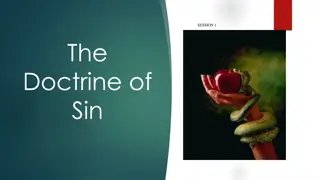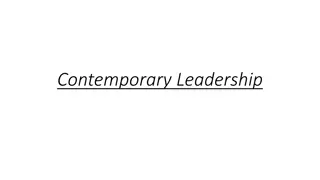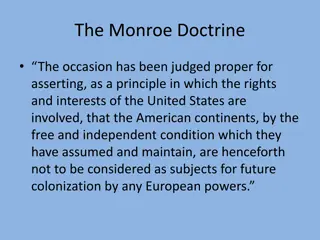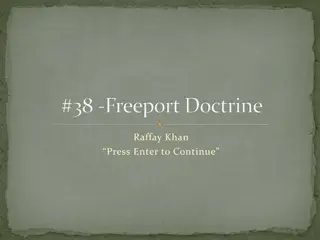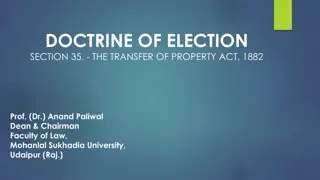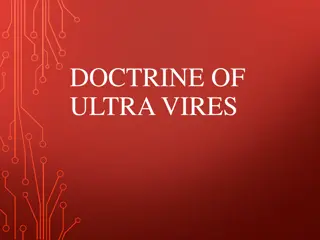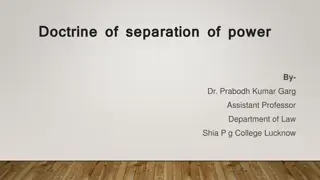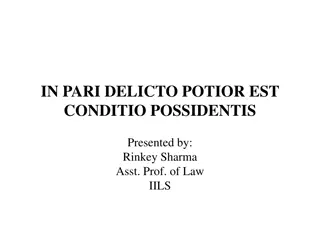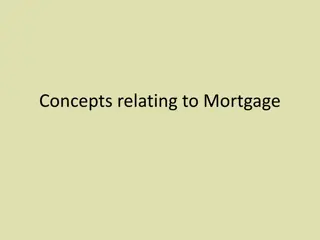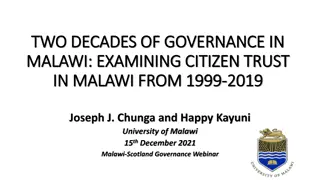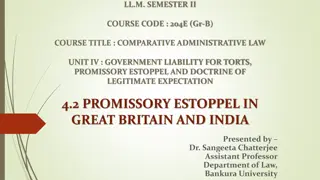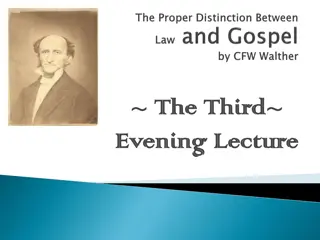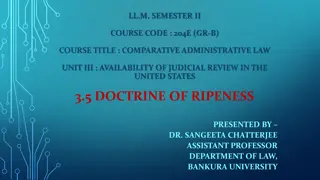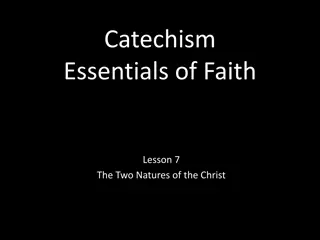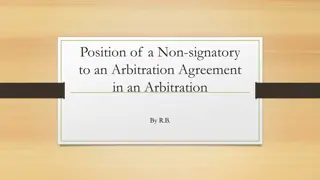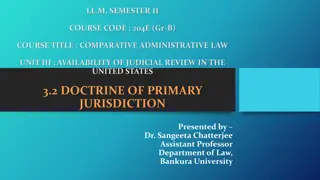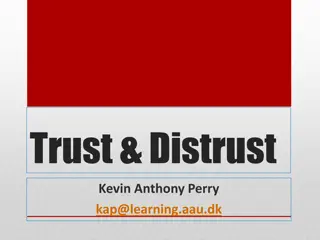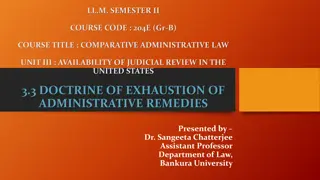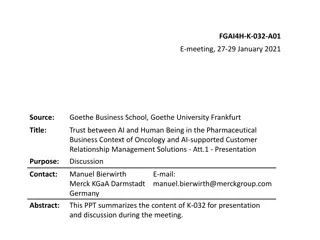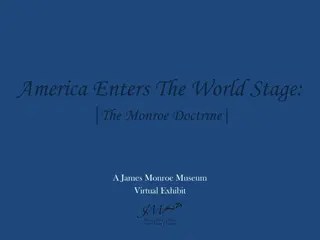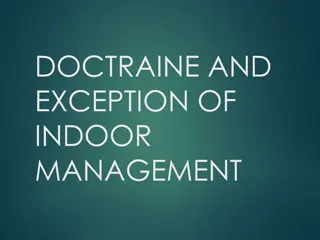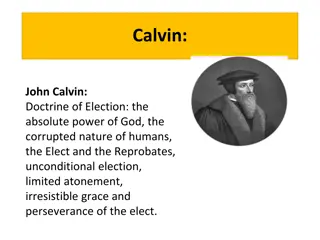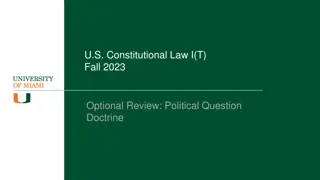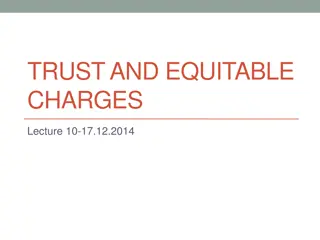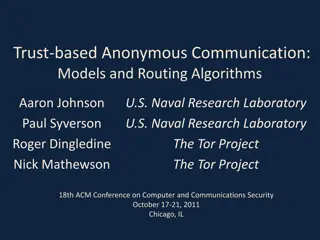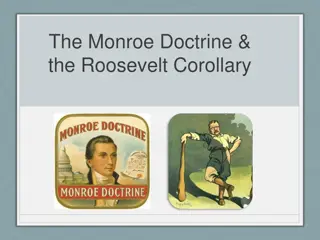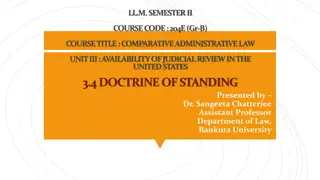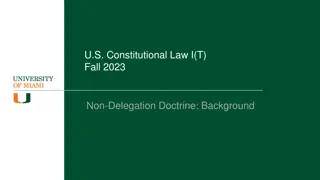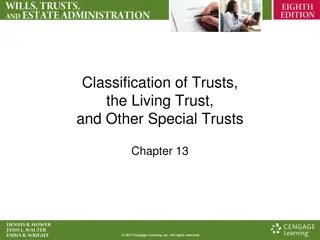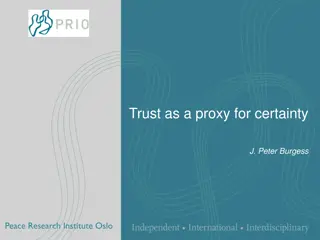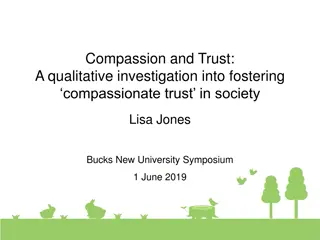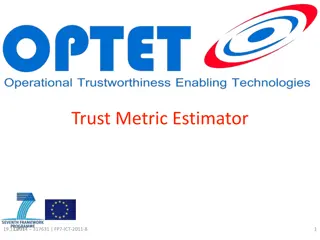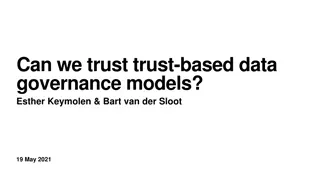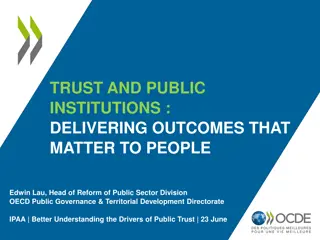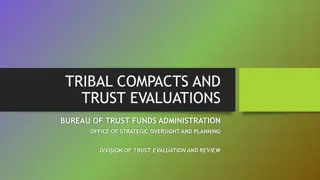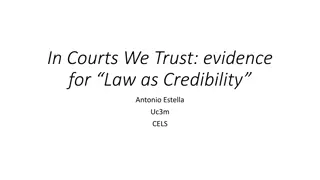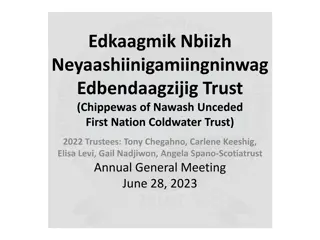Securitization of Covid-19 in Hong Kong: Trust and Success
Analyzing the successful securitization of Covid-19 in Hong Kong amidst low political trust, this study explores the role of trust, smart technologies, and governmental factors in managing the pandemic. Key elements include political trust, audience acceptance, smart technology trust, and effectiven
2 views • 19 slides
Understanding the Doctrine of Sin in Christian Theology
Explore the profound impact of sin as a transgression against God's holiness, its existence, extent, consequences, and common misunderstandings. Delve into biblical references on sin's definition and the origin of evil in the world. Gain insight into the significance of doctrine in aligning beliefs
1 views • 18 slides
Understanding Trust in Contemporary Leadership
Trust is the foundation of effective leadership, comprising elements like integrity, competence, consistency, loyalty, and openness. Trust plays a crucial role in leadership, impacting team performance and cooperation. Different types of trust - deterrence-based, knowledge-based, and identification-
0 views • 9 slides
The Monroe Doctrine: A Declaration of American Independence
The Monroe Doctrine asserts that the American continents are not to be colonized by European powers and considers attempts to extend European systems into the hemisphere as dangerous. The United States declares its non-interference with existing European colonies or dependencies.
0 views • 8 slides
The Freeport Doctrine and Stephen Douglas: A Historical Overview
Explore the history of the Freeport Doctrine as articulated by Stephen Douglas during his debate with Abraham Lincoln. Learn about Douglas's views on slavery, popular sovereignty, and the implications of the doctrine on territorial governance. Delve into the background, significance, and relations t
1 views • 10 slides
Doctrine of Election under Section 35 of the Transfer of Property Act, 1882
The doctrine of election under Section 35 of the Transfer of Property Act, 1882 deals with situations where a person professes to transfer property he does not own, and the owner must elect to confirm or dissent. If the transfer is gratuitous and the transferor is unable to make a fresh transfer, th
5 views • 17 slides
Understanding the Doctrine of Ultra Vires in Company Law
The doctrine of ultra vires in company law pertains to acts that are beyond a company's legal powers or authority as stated in its memorandum of association. This concept categorizes acts as ultra vires the directors, articles of association, or the company itself, with implications such as void con
1 views • 11 slides
Understanding the Doctrine of Separation of Power by Dr. Prabodh Kumar Garg
The doctrine of separation of power, as elucidated by Dr. Prabodh Kumar Garg, emphasizes the distinct roles of the executive, legislative, and judiciary branches to maintain checks and balances in governance. Originated by Montesquieu, this principle safeguards against tyranny and ensures liberty by
0 views • 27 slides
Doctrine of In Pari Delicto in Legal Context
The doctrine of in pari delicto (Latin for "in equal fault") dictates that when parties are equally at fault, the possessor's condition is considered better, meaning a person engaged in wrongdoing cannot sue another for the same act. Exceptions include the adverse interest and innocent insider excep
0 views • 4 slides
Understanding Marshalling of Securities in Mortgage Law
Marshalling of Securities, as per Section 81 of the Transfer of Property Act, addresses the scenario where a property owner mortgages properties to different individuals. This doctrine ensures subsequent mortgagees are entitled to have debts satisfied from properties not mortgaged to them while prot
0 views • 20 slides
Examining Citizen Trust in Malawian Governance Over Two Decades (1999-2019)
This paper critically analyzes public trust in key government institutions in Malawi from 1999 to 2019, highlighting a general decline in trust levels and its impact on political legitimacy. The study explores factors influencing public trust, such as perceptions of government performance, integrity
0 views • 12 slides
Understanding Promissory Estoppel in Comparative Administrative Law
Estoppel and specifically Promissory Estoppel have evolved as important legal doctrines to prevent injustice and ensure that promises made are upheld. This concept is explored in the context of administrative law, particularly looking at government liability for torts, the doctrine of legitimate exp
0 views • 12 slides
Army Leadership Doctrine Update: ADP 6-22.1 Highlights
New Army Doctrine Publication (ADP) 6-22.1, "Army Leadership and the Profession," emphasizes the foundational principles of leadership with updated content and guidance. It covers essential leadership traits, values, competencies, and behaviors, providing insights into effective leadership practices
1 views • 6 slides
Understanding the Difference Between Law and Gospel in Doctrine
Exploring the critical distinction between the Law and the Gospel in Christian doctrine, this content emphasizes the diverse roles each plays in addressing spiritual needs. It warns against the dangers of false doctrine and highlights how the Gospel offers comfort while the Law exposes sin. The impo
2 views • 25 slides
Leadership, Trust, and Crisis: Lessons from Central Europe Project
The project funded by multiple governments in Central Europe aims to advance sustainable regional cooperation. The initiative focuses on understanding leadership as a process involving trust, especially in crisis situations. The lesson structure includes case studies, discussions on resources, and e
4 views • 19 slides
Understanding the Doctrine of Ripeness in Judicial Review
The doctrine of ripeness in judicial review focuses on the timing of court intervention, ensuring that cases are mature enough for adjudication. It aims to prevent premature decisions and conflicts with other branches of government, emphasizing the need for cases to be fit for judicial review before
0 views • 12 slides
Understanding the Two Natures of Jesus Christ in Christian Doctrine
The concept of the two natures of Jesus Christ, divine and human, is explored through various biblical references and historical heresies such as Docetism. The struggles over the doctrine of the Trinity and the nature of Christ are interconnected, emphasizing the importance of understanding Christ's
6 views • 13 slides
The Doctrine of Privity and Non-signatory in Arbitration
The Doctrine of Privity in contract law states that only parties to a contract can enforce its terms, excluding third-party beneficiaries. However, in certain cases, such as piercing the corporate veil or involving group companies, non-signatory affiliates may be bound by an arbitration agreement. T
5 views • 16 slides
Understanding Doctrine of Primary Jurisdiction in Comparative Administrative Law
The doctrine of primary jurisdiction plays a crucial role in determining whether a court should yield to an administrative agency for certain issues. It helps in deciding which tribunal should take the initial action, especially in cases involving administrative discretion. This doctrine allows cour
1 views • 14 slides
Exploring Trust and Distrust in Social Interactions
Understanding the dynamics of trust and distrust within social interactions is vital for successful service delivery and relationship-building, especially in youth work settings. This case study highlights the complexities of gaining trust, the significance of trusting relationships, and the cultura
1 views • 50 slides
Doctrine of Exhaustion of Administrative Remedies in Comparative Administrative Law
The doctrine of exhaustion of administrative remedies requires litigants to pursue all available remedies with administrative authorities before seeking judicial review. Originating from the case of Myers v. Bethlehem Shipbuilding Corp, this doctrine aims to respect congressional intent and promote
1 views • 12 slides
Trust Dynamics in AI-Powered Pharmaceutical Business: A Critical Analysis
Exploring the intricate relationship between AI and human trust in the context of the pharmaceutical industry, this presentation delves into the factors influencing trust dynamics and proposes implementation strategies to foster trust between sales representatives and oncologists in AI-supported too
2 views • 12 slides
America Enters the World Stage: The Monroe Doctrine Virtual Exhibit
James Monroe's significant impact on American foreign policy, particularly through the Monroe Doctrine, is showcased in a virtual exhibit exploring his presidency and diplomatic legacy. From the Monroes' ambassadorial attire in Paris to the historical context of the doctrine's proclamation, delve in
1 views • 20 slides
Understanding the Doctrine of Indoor Management
Doctrine of indoor management implies that a company's internal affairs are its responsibility, allowing outsiders to assume that directors act within their apparent authority. This doctrine, originating from the case of Royal British v/s Turquand, protects outsiders under certain conditions. Constr
0 views • 11 slides
John Calvin's Doctrine of Predestination: A Summary
John Calvin's doctrine of predestination revolves around the absolute power of God, the corrupted nature of humans due to original sin, and the concepts of the Elect and the Reprobates. Calvin believed in unconditional election, limited atonement, irresistible grace, and the perseverance of the elec
0 views • 21 slides
Understanding Political Question Doctrine in U.S. Constitutional Law
Explore the intricacies of the Political Question Doctrine in U.S. Constitutional Law, focusing on key aspects such as textually demonstrable commitment, lack of judicially manageable standards, and the impact of standing on legal cases. Scholars debate whether the doctrine is jurisdictional and its
0 views • 20 slides
Understanding Trust and Equitable Charges in Property Law
Trust and equitable charges in property law involve a legal obligation where the property holder manages the property for the benefit of another person. This trust relationship consists of elements like legal title, trust property, and beneficiaries. The creators of a trust can be referred to as set
0 views • 25 slides
Trust-Based Anonymous Communication Models and Routing Algorithms
This research paper discusses trust-based anonymous communication models and routing algorithms in the context of onion routing, emphasizing the importance of trust in mitigating security risks from adversaries with resources. The paper presents a model of trust and proposes trust-based routing algo
0 views • 65 slides
The Monroe Doctrine and the Roosevelt Corollary: Evolution of US Foreign Policy
The content explores the historical context and evolution of US foreign policy through the Monroe Doctrine of 1823 and the Roosevelt Corollary of 1904. It discusses the principles outlined in each doctrine, their implications on US interactions with other nations in the Western Hemisphere, and the s
0 views • 4 slides
Understanding the Doctrine of Standing in US Judicial Review
The doctrine of standing in United States judicial review is explained, focusing on the capacity of a plaintiff to seek judicial review based on injury-in-fact, causation, and redressability. The requirements of the standing doctrine and its relation to Article III of the US Constitution are discuss
0 views • 12 slides
U.S. Constitutional Law I(T) Fall 2023: Non-Delegation Doctrine Overview
Exploring the Non-Delegation Doctrine in U.S. Constitutional Law, this content delves into the background, current doctrine, historical cases, and contextual considerations related to congressional delegation of regulatory powers. It addresses the constitutionality of Congress authorizing bodies suc
0 views • 46 slides
An Overview of Trusts: Classification, Living Trust, and Special Trusts
This comprehensive guide delves into the classification of trusts, including express and implied trusts, active versus passive trusts, cy-près doctrine, inter vivos trust, testamentary trust, and the rule against perpetuities. Explore the nuances and characteristics of each trust type and gain insi
0 views • 19 slides
Trust as a Proxy for Certainty in Social Cohesion
Exploring the intricate relationship between trust, security, and social cohesion, this study delves into how trust serves as a proxy for certainty in uncertain environments. By analyzing societal properties and the role of trust in managing risks and insecurities, the Peace Research Institute Oslo
0 views • 16 slides
Cultivating Compassionate Trust in Society: A Qualitative Exploration
This qualitative investigation delves into the concept of compassionate trust and its role in fostering positive societal interactions. Through a social constructionist lens, the study explores how individuals understand and embody compassionate trust, emphasizing the interconnectedness of compassio
0 views • 16 slides
Trust Metric Estimator: Computational Model for Trustworthiness Assessment
The Trust Metric Estimator project aims to create a computational model to estimate user trust levels towards system performance over time. It considers social and technical factors, integrating trust, trustworthiness, and economic aspects to aid decision-making. Research includes surveys to identif
2 views • 8 slides
Trust-Based Data Governance Models and Their Impact on Personal Data Regulation
This article delves into trust-based data governance models, contrasting them with control-based models in the context of personal data regulation. It explores the challenges and benefits associated with both approaches, emphasizing the emergence of new models centered on trust such as data stewards
0 views • 11 slides
Building Trust in Public Institutions: Insights and Strategies
Public trust in government institutions is declining in many OECD countries. Existing measures of trust often reflect leadership approval. Satisfaction with public services plays a crucial role in fostering trust. Investing in trust involves focusing on governance drivers and actions that enhance tr
0 views • 15 slides
Trust Evaluation Process in Tribal Compacts and Trust Funds Administration
Trust Evaluations are mandated under the Tribal Self Governance Act for Tribes engaging in trust programs. The Bureau of Trust Funds Administration conducts these evaluations, focusing on compliance with federal laws and safeguarding trust assets. The process includes questionnaires, reviews, and re
0 views • 13 slides
Trust Dynamics in Political Relationships: Evidence and Implications
Exploring the intricate dynamics of trust between Principals and Agents in political relationships, this study delves into the implications of mistrust and the shift in trust levels over time. Utilizing surveys on political trust and data on trust in governmental branches, the analysis sheds light o
0 views • 22 slides
Edkaagmik Nbiizh Neyaashiinigamiingninwag Trust Overview
Edkaagmik Nbiizh Neyaashiinigamiingninwag Trust, established in 2012 by Chippewas of Nawash Unceded First Nation Coldwater Trust, aims to benefit the First Nations community through various initiatives such as land acquisition, education advancement, and cultural preservation. The Trust is managed b
0 views • 15 slides

